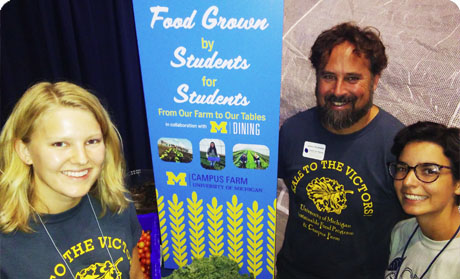
From Left to Right: Campus Farm Student Manager, Caroline Baloga; Campus Farm Program Manager, Jeremy Moghtader; and Campus Farm Student Manager, Carley Sharp
Campus Farm was chosen as a programming partner for the 2018 Community Relations Tailgate because it is an emergent gem in Ann Arbor and surrounding areas. Community members are likely familiar with the Matthaei Botanical Gardens, but may not know that it houses this working, educational farm which provides UM students with rich educational opportunities and contributes to the overall sustainability of the university and its surrounding area. Campus Farm-grown micro-greens, kale, and heirloom cherry tomatoes were prepared into a fresh and healthy salad by MDining executive chef Frank Turchan to feed guests at the Regents’ and President’s September 15th Tailgate. Also on display was a miniature version of Campus Farm’s three 30ft by 96ft hoophouses.
This living, learning laboratory for sustainable food systems at U-M provides educational, research, leadership, and employment opportunities related to the production of sustainable food and the study of food systems, including the Nature Academy intern program. Along with its collaborative partners the University of Michigan Sustainable Food Program (UMSFP) and the Sustainable Food Systems Initiative, the farm is transforming U-M into a world-class place for twenty-first century scholarly research, teaching, and engagement in sustainable food systems.

University of Michigan Campus Farm Manager Jeremy Moghtader
The farm produces food year round in Michigan using only the energy of the sun with our passive solar greenhouses or hoophouses.
In addition to collaboration with MDining, the Campus Farm partners with academic units to host courses and research. As might be expected, biology and ecology courses use the farm, but also some German, anthropology, and art and design courses. Current research projects focus on agro-ecology and ecosystem services of cover-cropping along with the life cycle assessment of greens production using passive solar greenhouse technology and comparing that to indoor production utilizing LED lighting. Researchers have included School for Environment and Sustainability (SEAS) faculty, staff, and PhD students, as well as seniors working on their honors thesis in Program in the Environment.
Learn more at The Matthaei Botanical Gardens Campus Farm

